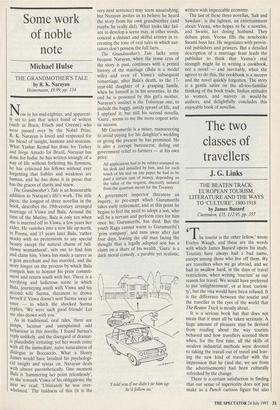Some work of noble note
Michael Hulse
THE GRANDMOTHER'S TALE by R. K. Narayan Heinemann, 0.99, pp. 134 Now in his mid-eighties, and apparent- ly set to join that select band of writers (such as Ibsen, Frisch and Greene) who were passed over by the Nobel Prize, R. K. Narayan is loved and respected for his blend of insight, humour and stoicism. What Yashar Kemal has done for Turkey and Jorge Amado for Brazil, Narayan has done for India: he has written lovingly of a way of life without forfeiting his firmness, he has criticised his fellows without ever forgetting that foibles and weakness are human, and he has done it in prose that has the graces of clarity and sinew.
The Grandmother's Tale is an honourable addition to Narayan's life's work. The title piece, the longest of three novellas in the book, describes the 19th-century arranged marriage of Viswa and Bala. Around the time of the Mutiny, Bala is only ten when she is married off to Viswa, a few years her elder. He vanishes into a new life up north, in Poona, and 15 years later Bala, 'rather stocky with no pretensions to any special beauty except the natural charm of full- blown womanhood', sets out to find him and claim him. Viswa has made a career as a gem merchant and has married, and the story hinges on the process by which Bala compels him to honour his prior commit- ment and return south with her. There is a terrifying and ludicrous scene in which Bala, journeying south with Viswa and his second wife Surma, threatens to drown herself if Viswa doesn't sent Surma away at once — to which the shocked Surma replies, 'We were such good friends! Let me also drown with you.' As in traditional, oral tales, there are Jumps, lacunae and unexplained odd behaviour in this novella. I found Surma's reply unlikely, and the disregard of dramat- ic plausibility irritating; yet her words come with all the immediate, naive naturalness of dialogue in Boccaccio. What a Henry James would have lavished his psychologi- cal insight and syntax on, Narayan deals with almost parenthetically. One moment Bala is 'hammering her point relentlessly', as she reminds Viswa of his obligations; the next we read: 'Ultimately he was over- whelmed.' The baldness of this (it is the
very next sentence) may seem unsatisfying; but Narayan invites us to believe he heard the story from his own grandmother (and maybe he really did). What looks like fail- ure to develop a scene may, in other words, conceal a distinct and skilful artistry in re- creating the tone of oral tales in which nar- rators don't possess the full facts.
The Grandmother's Tale lacks unity because Narayan, when the tense crux of the story is past, continues with a potted history of the marriage (Bala is a model wife) and even of Viswa's subsequent remarriage, after Bala's death, to the 17- year-old daughter of a grasping family, when he himself is in his seventies. In the end he is poisoned by this girl's mother. Narayan's instinct is the Tolstoyan one, to include the baggy, untidy sprawl of life, and I applaud it; but still his second novella, `Guru', seems to me the more cogent artis- tic success.
Mr Gurumurthi is a miser, manoeuvring to avoid paying for his daughter's wedding or giving the present he has promised. He is also a corrupt bureaucrat, doling out government relief to farmers — at his own price:
All applications had to be rubber-stamped on his desk and initialled by him, and for each touch of his seal on any paper he had to be paid a certain sum of money, depending on the value of the request, discreetly isolated from the quantum meant for the Treasury.
A government inspector threatens an inquiry, to pre-empt which Gurumurthi takes early retirement; and at this point he begins to feel the need to adopt a son, who will be a servant and perform rites for him once he, Gurumurthi, has died. But the youth Ragu cannot warm to Gurumurthi's `grim company', and runs away after just four days, leaving the old man facing the thought that a legally adopted son has a claim on a share of his wealth. 'Guru' is a dark moral comedy, a parable yet realistic, `1 told you if we didn't tie him up he'd follow us.' written with impeccable economy.
The last of these three novellas, 'Salt and Sawdust', is the lightest, an entertainment about Veena, who hopes to be a novelist, and Swami, her doting husband. They debate plots. Veena fills the notebooks Swami buys her. He negotiates with provin- cial publishers and printers. But a detailed description of a marriage feast leads the publisher to think that Veena's real strength might lie in writing a cookbook, not a novel — and inevitably, when she agrees to do this, the cookbook is a success and the novel quickly forgotten. The story is a gentle satire on the all-too-familiar thinking of the book trade, Indian attitudes to women, and naivety in would-be authors, and delightfully concludes this enjoyable book of novellas.


















































 Previous page
Previous page